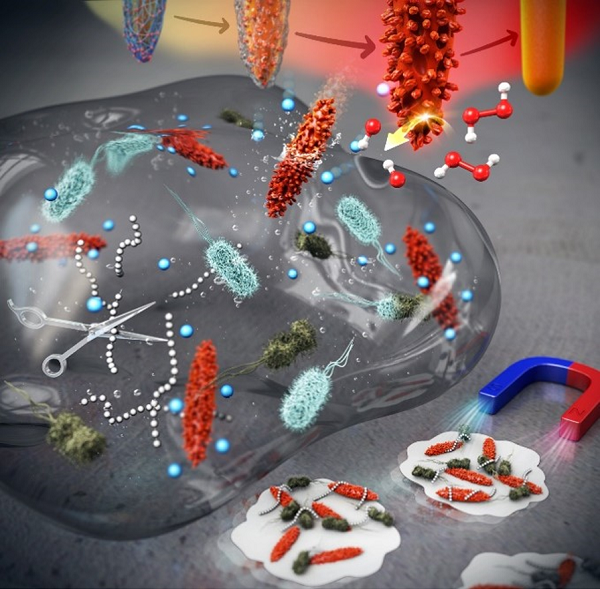Jan 11 2021
The COVID-19 pandemic has been increasing the fears of new pathogens like drug-resistant bacteria or new viruses. A Korean research group has recently gained attention for designing a new technology to eliminate antibiotic-resistant bacteria by regulating the surface texture of nanomaterials.
 Schematic diagram showing removal of bacteria biofilm via Mtex. Image Credit: Pohang University of Science and Technology.
Schematic diagram showing removal of bacteria biofilm via Mtex. Image Credit: Pohang University of Science and Technology.
A collaborative research group from Pohang University of Science and Technology (POSTECH) and UNIST has described a mixed-FeCo-oxide-based surface-textured nanostructures (MTex) as a highly effective magneto-catalytic platform in Nano Letters, an international journal.
The team included professors In Su Lee and Amit Kumar together with Dr Nitee Kumari from POSTECH’s Department of Chemistry and Professor Yoon-Kyung Cho and Dr Sumit Kumar from UNIST’s Department of Biomedical Engineering.
Initially, the team produced smooth surface nanocrystals in which several metal ions were encapsulated in an organic polymer shell and further heated them at an extremely high temperature. Annealing of the polymer shell led to a high-temperature solid-state chemical reaction that caused the blending of other metal ions on the surface of the nanocrystal, making several few-nanometer-sized branches and holes on it.
It was found that this special surface texture catalyzes a chemical reaction that generates reactive oxygen species (ROS) that destroys the bacteria. Also, it was verified to be highly magnetic and attracted toward the external magnetic field in a simple manner. The researchers had found a synthetic approach for transforming normal nanocrystals without the need for surface features into highly functional mixed-metal-oxide nanocrystals.
The researchers called this surface topography—with holes and branches that match that of a plowed field—“MTex.” This special surface texture has been confirmed to raise the mobility of nanoparticles to enable efficient penetration into the biofilm matrix while exhibiting high activity in producing reactive oxygen species (ROS) that are considered deadly to bacteria.
This system is capable of generating ROS over a wide pH range and can efficiently diffuse into the biofilm and thus destroy the embedded antibiotics-resistant bacteria. Moreover, the nanostructures are magnetic, thus enabling the biofilm debris to be taken out even from the difficult-to-reach microchannels.
This newly developed MTex shows high catalytic activity, distinct from the stable smooth-surface of the conventional spinel forms. This characteristic is very useful in infiltrating biofilms even in small spaces and is effective in killing the bacteria and removing biofilms.
Dr Amit Kumar, Study Corresponding Author, Pohang University of Science and Technology
“This research allows to regulate the surface nanotexturization, which opens up possibilities to augment and control the exposure of active sites,” noted Professor In Su Lee who headed the study. “We anticipate the nanoscale-textured surfaces to contribute significantly in developing a broad array of new enzyme-like properties at the nano-bio interface.”
This study was carried out with support from the Leader Researcher Program (Creative Research) of the National Research Foundation and the Institute for Basic Science of Korea.
Journal Reference
Kumari, N., et al. (2020) Surface-Textured Mixed-Metal-Oxide Nanocrystals as Efficient Catalysts for ROS Production and Biofilm Eradication. Nano Letters. doi.org/10.1021/acs.nanolett.0c03639.